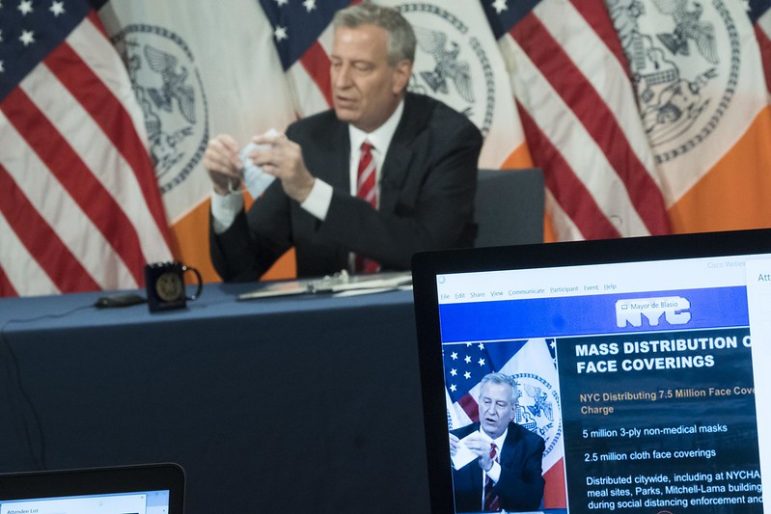
Ed Reed/Mayoral Photography Office
Mayor Bill de Blasio holds a media availability. City Hall. Monday, May 4, 2020.In the era of COVID, the need to enforce social distancing rules in New York City has placed the New York Police Department in a difficult situation. They are issuing fines of up to $1,000 for social distancing violations. Evidently, some officers are tackling people to the ground, arresting them, and locking them up, as we saw in the East Village this weekend. Though the officer in question has been moved to modified duty, this is likely not the first instance of aggressive policing we will see during our socially distanced summer.
For the most part, the NYPD has approached the task of keeping the public safe in a sensible way: reminding people to social distance in parks, and handing out five-packs of masks throughout the five boroughs. On the other hand, officers also arrested three people this weekend. As the weather continues to improve and we New Yorkers continue to go stir-crazy in our small apartments, social distancing violations, and in turn, arrests, may increase. Perhaps unsurprisingly, the people arrested last weekend were all people of color. Wealthier white sunbathers in New York City’s parks received educational information and masks. Officials including Public Advocate Jumaane Williams have been outraged by the differences in police response by race. In a city as large as New York, three arrests shows some police restraint, though the racially charged circumstances of this weekend’s arrests are inexcusable. As spring becomes summer, more people may start breaking the rules, and police patience may wear thin.
With New Yorkers of every race breaking social distancing rules on streets and in parks, it is troubling that the NYPD seems to take a gentle approach with white communities and a force-based one with communities of color. This phenomenon echoes the virus’ pattern more generally. The COVID pandemic has had a disparate impact on communities of color, who tend to have multigenerational households with older family members, smaller apartments, and essential jobs that keep them from sheltering in place. It is reasonable to assume that the majority of people pushed to the brink by New York State on Pause are those who can least afford a $1,000 fine or a stay in jail, but they are likely to be the ones targeted most by police. While we need to continue sheltering in place for the safety of ourselves and our communities, jail seems like a particularly peculiar strategy to maintain public safety at the moment.
 CityViews are readers’ opinions, not those of City Limits. Add your voice today!
CityViews are readers’ opinions, not those of City Limits. Add your voice today!
Even in the absence of COVID-19, activists have questioned the benefits of arrest and incarceration for years. We know that poverty and lack of access to opportunity are associated with criminality. We also know that days, months, or years locked behind bars exacerbate those very issues, leading to vicious cycles of criminality, arrest, imprisonment, release, and criminality once again. Beyond the obvious impacts of incarceration, the mark of a criminal record reduces the likelihood of someone ever getting a job. Interestingly, even when employers do not ask questions about criminal records in job applications, they tend to overlook black applicants, relying on false stereotypes to assume that all black-sounding names carry criminal convictions. As a society, we never truly forgive criminals even after they serve their time. We punish people, especially black men, for the rest of their lives, in ways that hurt communities of color more broadly, as well.
And then the coronavirus came to New York City.
Given the health risks of physical proximity right now, arrests carry new dangers. Officers are standing close to individuals (or in the case of the East Village, literally on top of an individual), arresting them, and bringing them to facilities with substandard sanitation and no opportunity for social distancing. Many people arrested are likely to be released quickly, but it does not take long for this virus to leap from person to person. When they return to their communities, which have been at a higher risk of mortality from COVID-19, they risk spreading whatever illness they picked up during their time behind bars, however short. In essence, there has never been a time when arrest has been more dangerous. Mayor de Blasio announced in the middle of April that over 1,500 inmates had been released due to the coronavirus, and Governor Cuomo has moved to release elderly prisoners across the state.
Arrest and incarceration have never been healthy for the individual arrested, but now, threats to public safety are more contagious than they have been in a century. The negative effects of incarceration have the potential to harm all of us, even those socioeconomically insulated from our criminal justice system. If the NYPD starts arresting more rule-breakers, detainees may act as vectors, and even our city’s millionaires may pay the price.
There is a healthier solution to social distance enforcing: keep making it easy for people to stay apart, especially as the city heats up. Keep handing out masks. Close more streets, not just those near parks, to give New Yorkers with cabin fever space to stretch their legs. Issue fines if absolutely necessary to let people know that carelessness carries consequences.
The solution to social distancing rule-breaking should not carry the same risks as the rule-breaking itself. Arrest merely replaces one form of irresponsible behavior with another, and in practice, it targets communities already suffering the most from the pandemic. As time goes on, arrest may become an important deterrent to keep a restless city of over 8 million from breaking the rules en masse, but for now, we should be wary of a solution that’s as bad as the problem.
Benjamin Heller is a graduate student at NYU’s Robert F. Wagner School of Public Service. On Twitter @BenjaminHeller0








